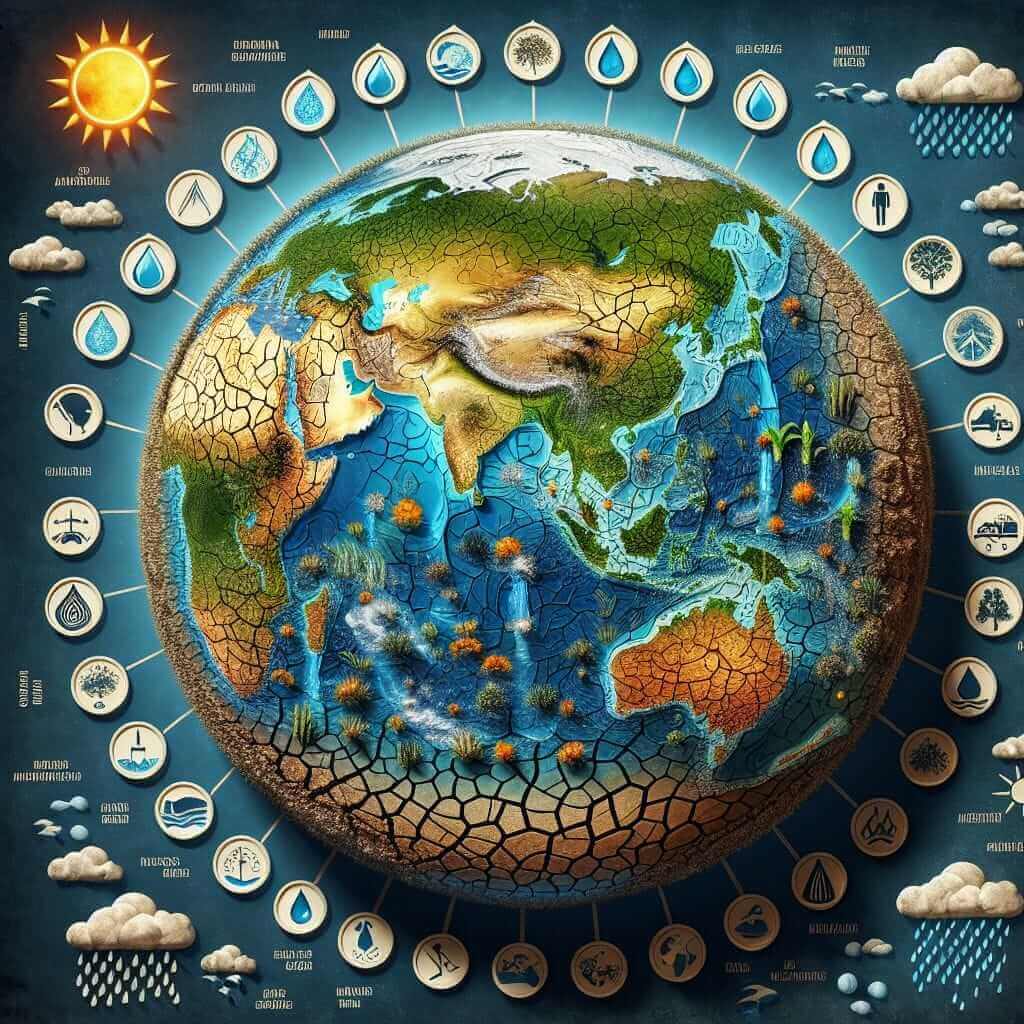The IELTS Reading section is a crucial part of the exam that assesses your ability to understand and interpret various texts. One common topic that appears in various forms in the IELTS Reading section is “Global challenges in water conservation.” This topic is becoming increasingly important due to the global scarcity of water resources and the growing concern about sustainable management. Based on past trends and the increasing relevance of this topic, it is highly probable that similar themes might appear in future IELTS exams.
Reading Practice Exercise
Passage: Global Challenges in Water Conservation
Global Challenges in Water Conservation
Water is a vital resource for all living organisms, and its conservation has become a critical global issue. Unfortunately, numerous challenges prevent effective water conservation efforts worldwide. Amongst these challenges are climate change, population growth, agricultural demands, and industrial consumption.
Climate Change: One of the most significant challenges is climate change, which alters precipitation patterns, leading to droughts in some regions and floods in others. These extremes make it difficult to manage water resources effectively.
Population Growth: The rapid increase in the global population intensifies the demand for water. Urban areas, in particular, face significant stress as they struggle to supply sufficient water to meet the daily needs of an expanding populace.
Agricultural Demands: Agriculture accounts for approximately 70% of global freshwater use. However, inefficient irrigation methods and wasteful practices often lead to substantial water loss. Modernizing irrigation techniques can significantly reduce water wastage.
Industrial Consumption: Industries are major consumers and polluters of water. Many manufacturing processes require vast amounts of water, which is often returned to natural sources contaminated with pollutants, posing further challenges to water conservation efforts.
Policy and Governance: Effective water conservation requires strong policies and governance. However, inconsistent regulations and lack of enforcement in many regions contribute to ongoing water scarcity issues.
In summary, tackling the global challenges in water conservation requires concerted efforts from governments, industries, and individuals. Through better management practices, technological advancements, and robust policies, we can ensure the sustainable use of this precious resource.
Questions
Multiple Choice
-
What is a primary effect of climate change on water resources?
A. Increase in urban water supply
B. Changes in precipitation patterns
C. Reduction in industrial water usage
D. Improvement in irrigation techniques -
Which sector uses the most freshwater globally?
A. Industrial sector
B. Agricultural sector
C. Domestic sector
D. Environmental sector
True/False/Not Given
-
Population growth mainly affects rural water supply. (True/False/Not Given)
-
Climate change leads to consistent rainfall patterns worldwide. (True/False/Not Given)
Matching Information
-
Match the following challenges with the appropriate descriptions given in the passage:
a. Industrial Consumption
b. Agricultural Demands
c. Policy and Governance- Requires the modernization of irrigation techniques.
- Involves controlling water pollution from manufacturing processes.
- Depends on enforcement to ensure effective water conservation.
Answers and Explanations
Multiple Choice
-
B. Changes in precipitation patterns
- Explanation: Climate change causes fluctuations in weather, leading to droughts and floods, making water management difficult.
-
B. Agricultural sector
- Explanation: Agriculture uses about 70% of global freshwater.
True/False/Not Given
-
Not Given
- Explanation: The text does not specify whether population growth mainly affects rural or urban water supply.
-
False
- Explanation: The passage states that climate change leads to varying precipitation patterns, not consistent ones.
Matching Information
-
-
b – Requires the modernization of irrigation techniques.
- Explanation: Agriculture often uses inefficient irrigation, requiring modernization.
-
a – Involves controlling water pollution from manufacturing processes.
- Explanation: Industries use large amounts of water and often pollute it post-usage.
-
c – Depends on enforcement to ensure effective water conservation.
- Explanation: Policy and governance gaps often lead to water conservation issues.
-
Common Mistakes
When tackling reading comprehension questions on water conservation, common mistakes include misinterpreting statistical data, confusing the specifics of the challenges, and overlooking key terms such as “policy and governance” relating to water management.
Vocabulary
-
Scarcity (noun): /ˈskɑːr.sə.ti/
- Meaning: The state of being in short supply; shortage.
- Example: Water scarcity is a growing concern in many urban areas.
-
Precipitation (noun): /prɪˌsɪp.ɪˈteɪ.ʃən/
- Meaning: Any form of water – liquid or solid – falling from the sky.
- Example: Climate change impacts precipitation patterns, influencing water availability.
Grammar Focus
Passive Voice
The passage uses passive voice to emphasize the actions and their recipients without specifying who performs the action.
- Example: “Agriculture accounts for approximately 70% of global freshwater use.”
- Construction: [Subject] + am/is/are + past participle
- Form: Agriculture (subject) + accounts for + 70% of global freshwater use (predicate)
Study Tips
To score highly in the IELTS Reading section:
- Practice regularly: Regular practice improves reading speed and comprehension.
- Understand question types: Familiarize yourself with different question types like True/False/Not Given and matching headings to save time.
- Expand vocabulary: A strong vocabulary aids in better interpretation of passages.
- Time management: Always practice under timed conditions to simulate the actual test environment.
- Review Mistakes: Analyze errors to understand and rectify them.
For further reading, consider exploring topics related to Challenges in Managing Water Scarcity and Global Water Scarcity Solutions.

By focusing on these areas, you’ll enhance your ability to comprehend complex texts, paving the way for a higher IELTS Reading score. Good luck!